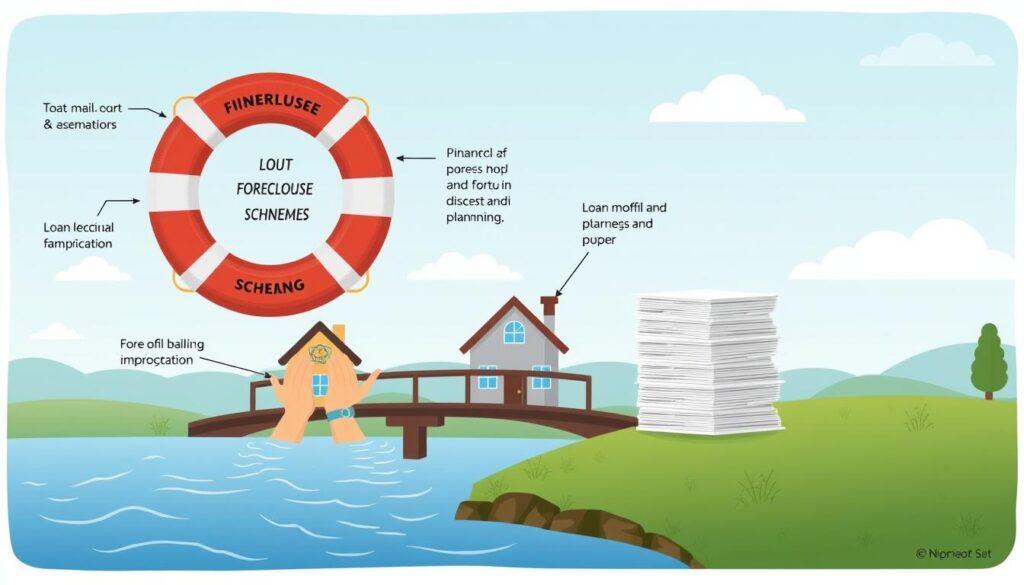Have you ever wondered how fast financial trouble can lead to foreclosure? In today’s economy, knowing about foreclosure bailout schemes is key. Homeowners facing the avoid foreclosure process often feel lost. We’ll explore ways to fight foreclosure and share financial support strategies, including government help.
The urgency of this situation is huge. Whether you’re looking at a bailout loan or government aid, your choice matters a lot. With the right info and tools, you can keep your home.
Key Takeaways
- Understanding your financial situation is critical in exploring foreclosure options.
- Foreclosure bailout loans may provide swift relief but come with high-interest rates.
- Government programs can serve as valuable resources for distressed homeowners.
- Always gather the necessary documentation to expedite your application process.
- Maintaining timely payments on any bailout loans is essential to avoid further issues.
- Recognize and avoid potential foreclosure rescue schemes that may take advantage of vulnerable homeowners.
Understanding Foreclosure and Its Implications
Foreclosure is a big risk for homeowners. It happens when a lender takes over a property because of missed payments. Knowing about this process and its effects is key for those facing money troubles. By understanding delinquency and available options, people can try to avoid foreclosure.
What Is Foreclosure?
Foreclosure means a lender takes a property when a homeowner can’t pay their mortgage. This lets the lender sell the property to get back what’s owed. Losing a home through foreclosure can hurt your credit and make it hard to manage money in the future.
Why Foreclosure Happens
Many things can lead to foreclosure, like losing a job, getting sick, or facing unexpected money problems. These issues can make it hard to keep up with mortgage payments. Knowing these risks can help homeowners take steps to avoid foreclosure.
The Emotional and Financial Impact on Homeowners
Foreclosure can deeply affect a person’s emotions, causing stress, anxiety, and uncertainty. It can feel like losing a part of oneself, as a home is often seen as a symbol of success and stability. The financial side also hurts, with credit scores dropping, making it harder to borrow money or get good insurance rates. Seeking help early is crucial to lessen these negative effects.
Exploring the Foreclosure Bailout Scheme Options
A foreclosure bailout scheme offers financial help to homeowners facing property loss. It’s important to know the different types of bailout schemes. These can provide crucial support during tough times.
What Is a Foreclosure Bailout Scheme?
A foreclosure bailout scheme helps homeowners manage their mortgage payments. It includes high-interest loans for quick cash and reverse mortgages. Homeowners should carefully consider these options based on their financial situation.
Types of Bailout Schemes Available
There are many bailout schemes to help homeowners. Here are some common ones:
- Bailout Loans: High-interest loans for immediate cash needs.
- Reverse Mortgages: Allows homeowners to use equity without immediate repayment.
- Government Programs: FHA and VA loans offer support with easier eligibility.
- Private Lender Options: Banks and mortgage companies offer different terms, including lower down payments.

When looking at bailout schemes, it’s key to understand the terms. You’ll need to provide income proof, tax returns, and bank statements. Knowing the eligibility criteria is crucial for making the right choice.
| Bailout Scheme Type | Key Features | Pros | Cons |
|---|---|---|---|
| Bailout Loans | High-interest loans for quick cash | Immediate funds to cover dues | High repayment costs |
| Reverse Mortgages | Access equity without monthly payments | Income stability for seniors | Reduces heirs’ inheritance |
| Government Programs | Supportive loans with flexible credit | Accessible options for distressed homeowners | May have specific eligibility restrictions |
| Private Lender Options | Loans from banks, varying terms | Potentially lower downpayment | Less favorable interest rates |
By understanding the different bailout schemes, homeowners can make better choices. This helps avoid foreclosure successfully.
Government Foreclosure Help Programs
Facing foreclosure can be tough, but there are many government programs to help. These programs offer financial aid and counseling to prevent losing homes. FHA, local, and state programs, along with HUD-approved counselors, are key in these efforts.
Federal Housing Administration (FHA) Assistance
The Federal Housing Administration has programs to help homeowners in trouble. They offer ways to manage mortgage payments for those who are unemployed or owe more than their homes are worth. Homeowners can get help to stabilize their loans.
FHA staff is ready to help at (877) 622-8525 or (800) CALL FHA (800-225-5342). TTY services are available for those with hearing or speech issues at (800) 877-8339. You can also email the FHA Resource Center for more help.
Local and State Programs
Local and state programs offer extra help, tailored to community needs. They provide financial aid and counseling to prevent foreclosure. Homeowners should look into what’s available in their area, as help varies by location.
HUD-Approved Housing Counselors
HUD-approved housing counselors are a great resource for homeowners facing foreclosure. They guide you through your options. Counselors help you understand your financial situation and find solutions like loan modifications or repayment plans.
Mortgage Relief Programs and How They Work
Mortgage relief programs help homeowners who are struggling with their mortgage payments. They offer different options to fit each person’s situation. This makes it easier for homeowners to get the help they need.
Understanding Mortgage Forbearance
Mortgage forbearance is a temporary fix for homeowners in tough financial spots. It lets homeowners pause or lower their payments for a while. This helps them get back on their feet without worrying about losing their home.
Many lenders offer forbearance plans. Some even waive late fees and other costs. This extra help can make a big difference.
Loan Modification Options
Loan modifications are another key part of mortgage relief programs. They change the terms of your mortgage to make payments more manageable. This can include extending the loan term or lowering the interest rate.
These changes are designed to last, unlike temporary payment pauses. They help homeowners keep up with their mortgage payments over time.
Refinancing Alternatives for Distressed Homeowners
Refinancing is a good option for homeowners who want to lower their payments or get better terms. Programs like Fannie Mae’s RefiNow and Freddie Mac’s Refi Possible offer big interest rate cuts. They also cover appraisal costs and let you roll closing costs into the loan.
Homeowners with government-backed loans can use Streamline Refinance. It makes it easier to adjust your mortgage to fit your budget better.

Personal Financial Assessment for Potential Solutions
For homeowners facing foreclosure, a personal financial assessment is key. It helps you find solutions by looking at your finances. Knowing your income, expenses, and debts is crucial. This knowledge helps you see if you qualify for financial help.
Next, you need to gather documents for your applications. This makes the process smoother when you’re looking for assistance.
Evaluating Your Financial Situation
Begin by reviewing your finances thoroughly. Make a detailed budget that covers:
- Monthly Income: Include all your income sources, like salary, benefits, and extra earnings.
- Monthly Expenses: List all your costs, such as mortgage, utilities, groceries, and debt payments.
- Outstanding Debts: Note down all your debts, including credit cards and personal loans.
This step helps you understand your financial situation. It also prepares you for talks with lenders or advisors.
Gathering Necessary Documentation for Applications
As you move forward, collect the documents you need for applications. Key items include:
| Document Type | Description |
|---|---|
| Tax Returns | Two years of filed returns show your income and financial status. |
| Bank Statements | Recent statements show your cash flow and savings. |
| Pay Stubs | They prove your current income over a period. |
| Debt Statements | They summarize your debts, showing monthly payments and balances. |
| Proof of Hardship | Document any financial troubles, like job loss or medical emergencies. |
Having your documents ready makes applying easier. It also boosts your chances of getting the help you need to avoid foreclosure.
Conclusion
Dealing with financial troubles can be tough, especially for homeowners facing foreclosure. It’s important to know the options available. There are many resources, like foreclosure bailout schemes and government programs, to help.
Looking into government programs and local help can ease financial stress. Homeowners should look for mortgage relief programs that fit their needs. With the right research and advice, keeping your home can become more possible.
Don’t face financial hardship alone. There are many options and experts ready to help. With the right steps, homeowners can stay on track and keep their dream of owning a home alive.






